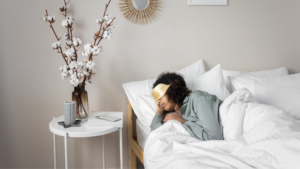Hey there, sleepyhead! Are you tired of tossing and turning at night, desperately seeking a restful slumber? You’ve come to the right place! In last weeks blog I talked about WHY rest is important and in this blog post, we’re going to have a friendly conversation about specific tips and tricks to help you improve the quality of your sleep. So grab a cup of chamomile tea, cozy up, and let’s embark on this quest for a blissful night’s sleep together!
 ESTABLISH A CONSISTENT SLEEP ROUTINE
ESTABLISH A CONSISTENT SLEEP ROUTINE
Picture this: you’re a captain, and your sleep routine is the ship sailing you into dreamland. A consistent routine helps regulate your body’s internal clock, making it easier to fall asleep and wake up naturally. Start by setting a fixed bedtime and wake-up time, even on weekends. Consider incorporating relaxing activities like reading a book, taking a warm bath, or practicing gentle stretches before bed. Your body will learn to associate these rituals with sleep, signaling the time to wind down.
Create a Sleep-Friendly Environment
Your sleep environment plays a crucial role in achieving a restful night. Make your bedroom a haven of tranquility by keeping it cool, dark, and quiet. Invest in comfortable bedding and a supportive mattress that suits your preferences. Consider using blackout curtains, earplugs, or a white noise machine to minimize external disturbances. Creating a peaceful atmosphere can do wonders for your sleep quality.
Limit Blue Light Exposure Before Bed
Technology is a double-edged sword when it comes to sleep. The blue light emitted by electronic devices such as smartphones, tablets, and laptops can disrupt your body’s production of melatonin, a hormone that regulates sleep. To combat this, establish a “screen curfew” by powering down electronic devices at least an hour before bedtime. Instead, unwind with activities like reading a book or engaging in a calming hobby.
Watch What You Eat and Drink
Food and drink choices can greatly impact your sleep. No one likes to hear this one (along with NOT using your phone before bed). Avoid consuming heavy meals, caffeine, and spicy or acidic foods close to bedtime, as they can cause discomfort and interfere with sleep. Instead, opt for light snacks such as a banana or a handful of almonds, and consider sipping on herbal teas like chamomile or lavender, which have soothing properties.
 Exercise Regularly, but Not Before Bed
Exercise Regularly, but Not Before Bed
Engaging in regular physical activity promotes better sleep as it helps release pent-up energy and reduces stress. However, try to avoid exercising vigorously right before bed, as it can leave you feeling energized and make it harder to wind down. Aim to complete your workout at least a few hours before bedtime, allowing your body to relax and transition into a sleep-ready state.
Manage Stress and Worry
Sometimes, a racing mind can keep us wide awake when we long for slumber. Prioritize stress management techniques to help calm your mind before bed. Experiment with relaxation exercises like deep breathing, meditation, or gentle yoga. Consider keeping a journal by your bedside to jot down any worries or thoughts.
 Seek Comfort in Your Preferred Sleep Position
Seek Comfort in Your Preferred Sleep Position
Finding the perfect sleep position is like discovering your sleep-time soulmate. Whether you’re a back, side, or stomach sleeper, find a position that aligns your spine and provides optimum comfort. Experiment with different pillows and mattress firmness levels to ensure proper support for your body.
Always remember that achieving better sleep requires patience and consistency. It’s about creating an environment and routine that work best for you. So go ahead, incorporate these tips into your nightly routine, and embrace the joy of restful slumber. May your dreams be sweet and your mornings filled with renewed energy. Sleep tight!







